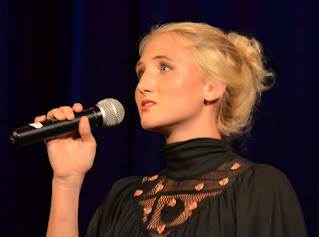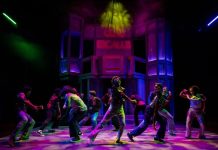This is the fourth in a series of interviews with the cast of The Masqueraders production of Translations. Meet Portia Norkaitis.

Joel: Introduce yourself to our readers and tell them what other shows you have appeared in and some of the roles you have played.
Portia: Good day. This is MIDN 4/C NORKAITIS, from 22nd Company, Brigade of Midshipmen. And if I didn’t have this honor of joining the Navy, I would have tried with all my might, to be on Broadway. I love acting, and am so happy that there is a troop like the Masqueraders on the Yard. Though my home town, the US Virgin Islands, may be wee, we have had many wonderful plays at the Pistarckle Theatre. I have been in The Wiz, Hairspray, and Smokey Joe’s Café, and have done numbers from Chicago, High School Musical, West Side Story, The Nutcracker, The Sound of Music, Jesus Christ Superstar, The Lion King, Beauty and the Beast, My Fair Lady, Grease, Oliver!, and South Pacific.
Why did you want to be in Translations produced by the United States Naval Academy’s Masqueraders?
Acting. Opening night is such a rush of energy and passion, and such raw human potential. We feed off of the audience and the audience feeds off of us. We seek to explore the child inside us all, the Aristotle in every mind, the Martha Graham in every body, the Audrey Hepburn in every gesture, the Gene Kelly in every step, and the Santa Claus in every Scrooge…
Acting is human, human is to act.
Thus in order to become the best leader I can, and serve my soldiers, country, and home to the best of my ability, I must continue with the theatre. What better way to learn how to truly communicate with a people, motivate, lead, and inspire them? Acting is a part of me. The Masqueraders have become my family. And we love to inspire.
What does this production of Translations say to your generation?
People perceive others based on the words, accents, and language emitted from their mouths. But this perception can be deceiving. If you do not speak a language, we can translate, as the title suggests, but can we truly understand? “I have no idea, But it’s all we have. I have no idea at all.” (Friel, Translations) Language is the root of every culture, and is what makes us human. Language is love, language is war, language is life.
Who do you play in Translations and how do you relate to your character?
I am Maire, strong of mind and strong of body. She is so cognizant of her passions and set on what she wants. I strive to be more like Maire in that respect – attuned with my passions, and strong-willed to accomplish those passions.
What do you admire about your character and what do you not admire?
Though Maire is aware of her passions and possesses the will to accomplish them, she could have been so much more sensitive regarding her rejection of Manus. If I ever plan on breaking up with a man I will tell him to his face, not covertly sneak off with another man, while still keeping my soon-to-be exe’s hopes up. That is cruel.
Though Maire is a very selfless person (she takes care of 10 children, is always making sure everyone has their ration of milk, works in the hayfield for hours on end, etc.), Translations follows a tract showcasing Maire’s selfish side, her pent up frustration, and sneering comments. As her actress I understand this pent up frustration and gripe, however with what is allowed in the play, it is hard to showcase the reasoning behind my many snide comments. It is hard to win over the audience. Manus is the one people feel sorry for, while Maire just looks bedraggled.
What have been the challenges you have encountered while preparing for your role and how have you overcome these challenges? How did your director help you?
An aficionado for the musicals, Translations is my first dark comedy, and thus the first production in which I have had to tap the crazy, dark facets of a character. I’m not used to playing the strong-willed lassie who falls in love and causes the destruction of her hometown. Strong willed I have played before, but not destructive. I have learned the civilities of human nature, I have learned language, and I have learned the Irish of 1833, thanks to Dr. Stanlake. She has taught me how to break up monologues and add emotion to profound places that most people would take for granted. Every word is precious, that is why it was written that way.
Translations may be dark, but it is a comedy after all, and I would be amiss if I didn’t say there were many a times when Dr. Stanlake, the cast, and I would finally understand a joke in the play and laugh long about it afterwards. Then, there are the accents. Dear God, the accents. A laughing matter, but truly intrinsic to understanding this play, and to materializing the moments, because accents, language – they are the foundation, the root of one’s culture.
What is your big highlight in the show and what do we learn about your character when you perform it?
Maire’s monologue in the midst of Act III is where I “Let it Go.” It is my transformation from Queen Elsa, proper and coherent, to The Snow Queen, wild and impassioned. I let go of all pent up emotions. By utilizing language I reel people into this tumultuous emotional roller coaster-ride I am on, and through my lack of coherency I let people into my heart.
What have you learned about yourself during this whole process?
Acting is my outlet for letting go, for letting people see me, and for letting them into my soul. On another note, so many things in this world could have been remedied or avoided altogether if people had just communicated better with one another. Translations has made me realize how important communication is, and how learning to communicate with people is a life-long process. I strive to become a better communicator. I strive to translate.
What do you want audiences to take with them after watching you perform in Translations?
To verbally jest at something of all too serious a nature – this is what Brian Friel accomplishes in his Translations. How else could we understand the atrocities of war, or comprehend the all-encompassing nature of love?
Through this play we hope you realize the importance of language: how it in the shape of rumors can spread like wildfire, and how at its basest form, is the root of one’s culture. Translations shows us how once that root starts being stripped away from a people, their culture and their way of life, is lost to the winds that blow over Tobair Vree. Terrible things can happen, but love can happen as well. The course that follows, ebbs and flows like the river from Bun na hAbhann.
What roles would you like to play in the future?
My dream role is Maria from West Side Story. My favorite song, “Somewhere” is transient through all generations, and as I have learned, applicable to Translations. My favorite song from West Side Story describes all of the relationships in Translations, and the need for love that all humanity shares: “Somewhere, there’s a place for us, peace and quiet and open air, take me there somewhere. Someday, there’s a time for us, time together with time to spare, time to learn, time to care. Someday. Somewhere.”
Translations plays on November 14, 15, 21, and 22, 2014 at Mahan Hall at The US Naval Academy – 106 Maryland Avenue, in Annapolis, MD. For tickets, purchase them online or at the door.
LINKS
Meet the Cast of ‘Translations’ at Masqueraders at the United States Naval Academy–Part 1: Jonson Henry.
Meet the Cast of ‘Translations’ at the Masqueraders at The United States Naval Academy–Part 2: Chris Hudson.
Meet the Cast of ‘Translations’ at the Masqueraders at The United States Naval Academy Part 3: Megan Rausch.




